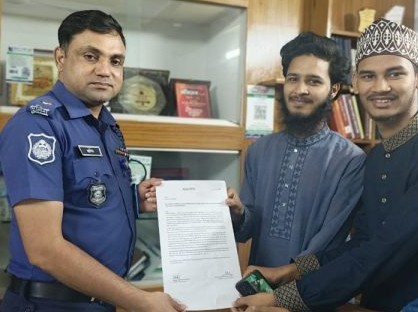The Cox’s Bazar unit of the Chhatra Majlish has demanded the arrest of human rights activist and Christian pastor of Rohingya origin, Peter Saiful, blaming him for working with the International Crisis Group (ICG) and the Arakan Army (AA).
The radical Islamist group alleged that Peter Saiful is converting Rohingya Muslims to Christianity in the refugee camps in Ukhiya, Cox’s Bazar. Demanding his arrest, they submitted an application to the Cox’s Bazar Deputy Commissioner and Superintendent of Police on Wednesday.

They claimed that as part of a plan to send converted families abroad, an application was made citing insecurity in the camp, and later, 65 Christian families were moved to transit camps.
The Chhatra Majlish claimed that Peter damaged Bangladesh’s reputation by sharing internal camp information with foreign NGOs.
They also warned of a strict agitation program if he was not arrested.
Peter Saiful has rejected the claims of religious conversion as baseless and his links to the ICG and AA. He said the radical Islamists of the Arakan Rohingya Salvation Army (ARSA) have long been harassing him for working as a volunteer pastor and human rights defender.
Brig Azmi’s Dark Plan: Islamizing army, unleashing suicide squads on India
On June 29, the Ukhiya police stations registered a general diary when Peter Saiful sought protection via the Kutupalong camp in-charge.
Since December 2024, Peter Saiful and other Christian leaders have been subjected to a disturbing campaign of threats and hate speech. Posters bearing his image and that of his younger brother, Nur Emmanuel, have been circulated throughout the camp, accusing them of proselytising and calling for their beheading.
These threats, Saiful says, are not random; they are organised, deliberate, and increasingly dangerous.
“Fatwas have been issued by religious students from inside the camp, calling for my death and the death of others like me,” he said. “Militant groups have openly declared that they will destroy our shelters inside the UNHCR Transit Centre.”
Among the individuals allegedly orchestrating these threats is Osama Ibrahim, a known ARSA commander operating from Camp 1W. Saiful reports that Ibrahim has created and distributed videos explicitly calling for attacks against the Christian camp sector. Armed men are now frequently seen near the Protection Center, intensifying fears of a repeat of the 2020 assault.
Rohingya Christian refugees more vulnerable as ARSA gets stronger
ICG: Rohingyas from Bangladesh camps are fighting against Arakan Army
Despite multiple reports to the UNHCR’s protection focal points and the local police, no concrete action has been taken. While a UNHCR legal advisor has urged Saiful to file a cybercrime case, he remains cautious.
“As a Christian leader, I hesitate to pursue legal action that might further inflame tensions. I fear retaliation not just against me, but against all Rohingya Christians.”
Forgotten Persecution: Rohingya Christians Under Attack
While the plight of Rohingya Muslims has received widespread international attention—particularly after the military-led genocide in Myanmar’s Rakhine State in 2017—the story of Rohingya Christians remains largely untold. Estimates suggest that there are fewer than 1,500 Rohingya Christians globally, many of whom live in fear of both the Burmese regime and their own displaced community.
According to numerous accounts, Rohingya Christians have long faced harassment, forced conversions, social ostracism, and physical attacks inside both Myanmar and the refugee camps in Bangladesh.
The most devastating recent attack occurred on January 26, 2020, when an armed group stormed a Christian enclave inside Kutupalong camp. The assault resulted in the deaths of two community members, the injury of a dozen others, and the sexual assault of seven women. Most horrifyingly, a teenage Christian girl was abducted, forcibly converted, and married to a member of the ARSA—a shadowy militant group active in the camps. Her whereabouts remain unknown.
Following the attack, around 25 Christian families, including Peter Saiful’s, were relocated by UNHCR to a transit centre within the camp. Although the relocation was intended to be a protective measure, Peter Saiful states that it has provided little real safety.
Peter Saiful’s family fled their home in Rakhine State, Myanmar, in 1992. At the time, waves of military crackdowns, forced labour, land seizures, and systemic denial of citizenship had led tens of thousands of Rohingya to seek refuge in Bangladesh. Like many others, the Saiful family arrived in Nayapara Refugee Camp and later in Kutupalong, hoping for temporary shelter and eventual justice. That justice has never come.
In the years that followed, Saiful found both strength and solace in his Christian faith, which his family had embraced inside Myanmar. Over time, he became a community leader, pastor, and quiet defender of religious freedom in one of the world’s most marginalised groups. Today, he pastors a small community of Rohingya Christians—a group that, though often overlooked, has faced decades of abuse and isolation.
Today, Peter Saiful and the 25 Christian families he represents continue to live under severe duress at the Transit Centre. Children are unable to attend school safely, women live in fear of abduction, and pastors cannot openly practice their faith.
Peter Saiful says they need urgent international intervention: physical protection for Christians within the camps; investigation and dismantling of armed groups threatening minorities; resettlement opportunities for high-risk religious minorities; and clear recognition of Rohingya Christians as victims of both ethnic and religious persecution.
Peter Saiful is converting Rohingya Muslims into Christianity.